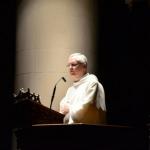This is the first of two homilies I’m preparing for this weekend. It is tied to the Year A readings used for RCIA scrutinies.
+
It may be one of the great unsolved mysteries of the New Testament—a question that no one can answer.
What ever happened to Lazarus?
After this extraordinary miracle, what did he do?
Legends about him have sprung up. Some traditions hold that he left Judea and settled in Cyprus, where he eventually became a bishop. The Orthodox built a church dedicated to “St. Lazarus” over what they believe to be his tomb and they celebrate “Lazarus Saturday,” the day before Palm Sunday. Another story holds that he settled in what is now France, where he supposedly lived another 30 years after the death and Resurrection of Christ.
But if we turn to scripture for reliable clues for what happened to Lazarus, there is nothing. The gospels are silent.
We never find out, as Paul Harvey would say, the rest of the story.
And I think there may a good reason for that.
It’s because the rest of the story…is us. What happened to Lazarus is less important than what happens to us.
It is up to us to live out the promise of Lazarus, the gift of another beginning, a second chance.
Fundamentally, this event is about death and rebirth—and it foreshadows, in a powerful way, the Resurrection of Christ himself, which we will celebrate in just two weeks.
But it is also about darkness and light. Leaving the darkness of the tomb and staggering out into the light of day—and doing it for one reason:
And that is: To answer the call of Jesus.
That is the story of Lazarus.
But it’s also the story of our elect, who tonight are just days away from becoming full members of the Catholic Church.
And it’s the story of every one of us who is here tonight with them. Every one of us has been called by Christ.
How have we answered?
As we near the final days of Lent, and we encounter this gospel, I look back on what this season has meant to us. It’s been a time of repentance and reconciliation. Prayer and penance. A time of sacrifice.
And when I hear these words of Christ, spoken to his friend—“Come out” – I realize: he is not addressing them just to Lazarus.
He is speaking to all of us.
It is the call that he has offered to each of us from the very first day of Lent, when we stood with ashes smeared on our foreheads. We were reminded of our own death – remember you are dust and to dust you will return – and we were invited to turn back to the gospel.
Christ was saying to us: “Come out.”
Come out from your personal tomb. Come out from sin. Come out from what is dead and I will restore you to life.
The tears that Christ shed for Lazarus are ones he sheds for all of us who are buried in caves of human weakness and sin. And so he calls to us. He beckons us – not with a whisper, but with a cry.
“Come out!”
Have we heard him?
Have we answered him?
Christ’s final words in the gospel are words of quiet but profound hope: “Untie him and let him go.” Like Lazarus, we stand before God – bandaged, wounded, trapped. We are prisoners, bound by brokenness. But Jesus wants us to be free. He wants us to breathe again. To live again.
Come out, he says.
Our 40-day Lenten pilgrimage is almost over. There is still time to rediscover the zeal that we all had on Ash Wednesday, when we proudly wore that mark of penitence on our foreheads. Maybe it’s a mark a lot of us left in the bathroom sink. But we should continue to carry it—in our hearts and on our consciences, striving with every day to continue our journey, working to reconcile ourselves with one another, and with God.
Now is the moment to reconsider. To recommit. To open our hearts, and our ears to hear the call of Christ.
When it comes to Lazarus, we may never know “the rest of the story.”
But we can write a new ending to our own story.
The fact is: Lazarus’s story is our story. We have been called to leave the tomb. Called to light. Called to new life. We have a chance to begin again.
How will we respond?
Image: Wikipedia
















